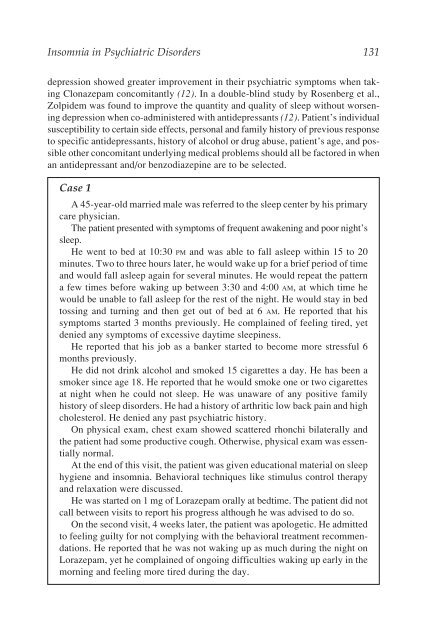Insomnia Insomnia
Insomnia Insomnia
Insomnia Insomnia
You also want an ePaper? Increase the reach of your titles
YUMPU automatically turns print PDFs into web optimized ePapers that Google loves.
<strong>Insomnia</strong> in Psychiatric Disorders 131<br />
depression showed greater improvement in their psychiatric symptoms when taking<br />
Clonazepam concomitantly (12). In a double-blind study by Rosenberg et al.,<br />
Zolpidem was found to improve the quantity and quality of sleep without worsening<br />
depression when co-administered with antidepressants (12). Patient’s individual<br />
susceptibility to certain side effects, personal and family history of previous response<br />
to specific antidepressants, history of alcohol or drug abuse, patient’s age, and possible<br />
other concomitant underlying medical problems should all be factored in when<br />
an antidepressant and/or benzodiazepine are to be selected.<br />
Case 1<br />
A 45-year-old married male was referred to the sleep center by his primary<br />
care physician.<br />
The patient presented with symptoms of frequent awakening and poor night’s<br />
sleep.<br />
He went to bed at 10:30 PM and was able to fall asleep within 15 to 20<br />
minutes. Two to three hours later, he would wake up for a brief period of time<br />
and would fall asleep again for several minutes. He would repeat the pattern<br />
a few times before waking up between 3:30 and 4:00 AM, at which time he<br />
would be unable to fall asleep for the rest of the night. He would stay in bed<br />
tossing and turning and then get out of bed at 6 AM. He reported that his<br />
symptoms started 3 months previously. He complained of feeling tired, yet<br />
denied any symptoms of excessive daytime sleepiness.<br />
He reported that his job as a banker started to become more stressful 6<br />
months previously.<br />
He did not drink alcohol and smoked 15 cigarettes a day. He has been a<br />
smoker since age 18. He reported that he would smoke one or two cigarettes<br />
at night when he could not sleep. He was unaware of any positive family<br />
history of sleep disorders. He had a history of arthritic low back pain and high<br />
cholesterol. He denied any past psychiatric history.<br />
On physical exam, chest exam showed scattered rhonchi bilaterally and<br />
the patient had some productive cough. Otherwise, physical exam was essentially<br />
normal.<br />
At the end of this visit, the patient was given educational material on sleep<br />
hygiene and insomnia. Behavioral techniques like stimulus control therapy<br />
and relaxation were discussed.<br />
He was started on 1 mg of Lorazepam orally at bedtime. The patient did not<br />
call between visits to report his progress although he was advised to do so.<br />
On the second visit, 4 weeks later, the patient was apologetic. He admitted<br />
to feeling guilty for not complying with the behavioral treatment recommendations.<br />
He reported that he was not waking up as much during the night on<br />
Lorazepam, yet he complained of ongoing difficulties waking up early in the<br />
morning and feeling more tired during the day.


